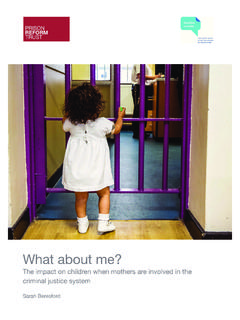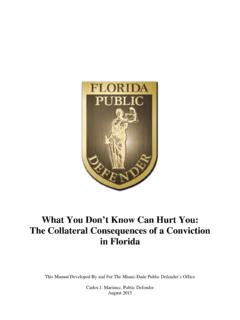Transcription of How to explain Jails and Prisons to Children - Friends Outside
1 How to Jails and Prisons ..to Children A Caregiver s Guide California Department of Corrections and Rehabilitation And Friends Outside 2 What is this booklet about? When parents are arrested or put in jail or prison , their Children are often scared, confused and upset. This is not a rare event. In 1999, one out of 50 Children in the United States had a parent in state or federal prison . Often, people don t talk about having a family member in prison because it is very personal information. Children , though, may have a lot of questions.
2 This booklet may help explain to Children and families what it is like to have a mother, father, or other close family member who is incarcerated. Who is this booklet for? This booklet is designed to help moms, dads and caregivers answer Children s questions about jail and prison . When Children and families receive accurate information, they can understand and cope with some of the stress they may experience when a relative goes to jail or prison . Most Children are curious about Jails and Prisons , and many adults don t know what these institutions are like.
3 The Friends Outside Visiting Center has put together some questions and answers to help tell the difference between myths and facts. This booklet is written to reassure families of inmates. It promotes open and honest communication between Children and adults. Ideally, even Children old enough to read the booklet on their own will read it with their caregiver. Children too young to understand it on their own can also benefit if an adult talks with them about the topics in this booklet. These young Children need to be guided by adults through the experience of talking in an emotionally safe, comforting, and nurturing way.
4 3 Definitions The words used in the criminal justice system are often confusing because they can mean different things in different places. Some definitions listed below may help the reader who is not used to the criminal justice system. Jails and Prisons are a place where people who have been accused or convicted of crimes are confined or incarcerated. Generally, people stay in jail if they are sentenced for less than a year s time or if they are waiting for their trial. If they receive a sentence for more than a year, they go to prison .
5 People who are incarcerated are often called inmates. The court may order supervision instead of, or following, incarceration. This is called probation or parole or post- prison supervision (PPS). The offender is supervised by a probation or parole officer in the community where he or she lives. Supervised means that the person must follow certain rules called conditions. If these conditions are not followed, the person may have to go to jail or prison . 4 About Families There are all kinds of families. Sometimes Children live with their birth or adoptive mother and father.
6 Sometimes they live with their mother or father. Sometimes they live with step-parents or grandparents. When a parent is incarcerated, the Children may change homes to live: With the other parent. With another family member. In foster care provided by a family member. In foster care provided by someone they don t know. A change in whom the child lives with may mean moving to a different neighborhood, school, town, or even a different state. Sometimes brothers and sisters live with different people. All of these changes can be very hard on Children .
7 It may help the child to write down where family members are at this time, using the outline at the end of this booklet. 5 Feelings and Emotions When a family member, such as a mom or dad, goes to jail or prison , it may be very difficult for everyone involved. For some Children , the experience can be emotionally devastating, while for others it is less serious. Sometimes it is a relief. The child s age, understanding of the situation, and the reaction of others, particularly of family Members, all play a part in the overall impact the experience will have on the child.
8 Children may have different feelings, and sometimes even several feelings at once, or one right after the other. Some Children might feel sadness, fear, guilt, disbelief, anxiety, anger, and/or powerlessness. It is important to help Children understand and work through their feelings. 6 Common Questions To help Children work through some of their feelings, including curiosity, we ve repeated some common questions we hear from families and our suggestions for helping caregivers to respond. Why did mom or dad go to jail or prison ?
9 People are sent to jail or prison because they did not obey the law. Laws are rules that tell us how people should and should not behave. Children have rules of behavior, too. When some Children break the rules, they may get a time out or lose privileges. prison and jail are like long time outs for adults. Sometimes even a child as young as 15 who breaks the law and commits a crime could go to jail or prison like some adults who break the law. They would have to commit a very bad crime such as seriously hurting another person. This does not happen very often.
10 Teenagers who break the law usually go to special Prisons for young people. What will happen to me? Children may have a lot of change in their lives when a parent goes to jail or prison . No one likes to feel insecure. The following questions can guide discussion, and even answers, to provide reassurance: How long will my parent be in jail or prison ? Will I live in the same place? Will I have to move? Who will I live with? Will I be able to live with my parent when he or she gets out of jail or prison ? 7 Is it my fault? NO!

![DELIVERANCE PRAYERS to be said OUT LOUD[1]](/cache/preview/a/6/0/7/f/c/b/e/thumb-a607fcbe511b164c4fc939ebe9857ff7.jpg)



